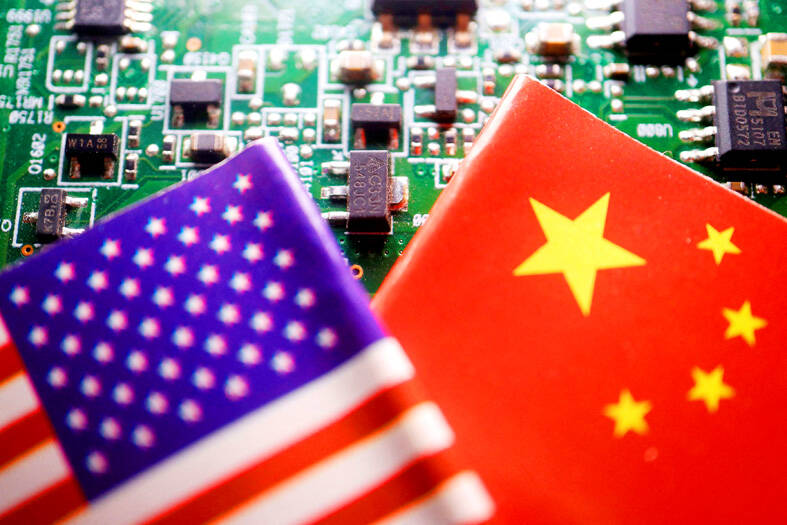US President Joe Biden’s administration is weighing sanctions on several Chinese tech companies, including memory chipmaker Changxin Xinqiao Memory Technologies Inc (CXMT, 長鑫新橋) in a fresh bid to restrain Beijing’s development of advanced semiconductors, people familiar with the matter said.
The US Department of Commerce’s Bureau of Industry and Security (BIS) is considering adding CXMT to its so-called Entity List, which restricts companies’ access to US technology, the sources said.
The BIS is also considering restricting five other Chinese firms, they said, adding that the list is not final.

Photo: Reuters
CXMT makes chips used in a wide range of products, including computer servers and smart vehicles. It competes with US-based Micron Technology Inc and South Korea’s Samsung Electronics Co and SK Hynix Inc. Micron funded an advocacy group that has long pushed for CXMT to be restricted.
The BIS and White House National Security Council declined to comment.
“We actively endorse and promote free and fair competition,” CXMT said in a statement. “Our commitment to this principle is demonstrated by our strict compliance with all relevant laws and regulations, including US export regulations.”
The company said that its chips were used in “everyday consumer products, with a specific focus on civilian and commercial applications.”
The potential sanctions are a response by the Biden administration to a chip breakthrough that Huawei Technologies Co (華為) made last year, US House of Representatives Foreign Affairs Committee Chairman Michael McCaul said in an interview last week.
The US department is weighing a sanctions package on multiple firms, McCaul said, without naming CXMT.
Huawei launched a 5G phone last year with an advanced 7-nanometer semiconductor made in China. It was lauded as a significant breakthrough considering that the administration of former US president Donald Trump cut off Huawei’s access to leading global chipmakers in 2020 over national security concerns. The handset signaled that the country’s chip industry was further along than expected.
The Biden administration has stepped up use of the department’s Entity List to keep Chinese companies from obtaining the latest US technologies. US suppliers are blocked from selling certain advanced products, equipment and components to customers on the list unless they obtain a special license from the US Department of Commerce.
Several key Chinese tech companies are already subject to those sanctions, including Shenzhen-based Huawei, its chipmaking partner Semiconductor Manufacturing International Corp (中芯國際) and lithography machine maker Shanghai Micro Electronics Equipment Group (上海微電子). In 2022, Yangtze Memory Technologies Co (長江儲存科技) was added to the list.
Beyond the blacklisting, the US is urging allies to work more closely together to contain China’s rise. The Biden administration is pressing the Netherlands, Germany, South Korea and Japan to further tighten restrictions on China’s access to semiconductor technology.

Taiwan’s foreign exchange reserves hit a record high at the end of last month, surpassing the US$600 billion mark for the first time, the central bank said yesterday. Last month, the country’s foreign exchange reserves rose US$5.51 billion from a month earlier to reach US$602.94 billion due to an increase in returns from the central bank’s portfolio management, the movement of other foreign currencies in the portfolio against the US dollar and the bank’s efforts to smooth the volatility of the New Taiwan dollar. Department of Foreign Exchange Director-General Eugene Tsai (蔡炯民)said a rate cut cycle launched by the US Federal Reserve

Handset camera lens maker Largan Precision Co (大立光) on Sunday reported a 6.71 percent year-on-year decline in revenue for the third quarter, despite revenue last month hitting the highest level in 11 months. Third-quarter revenue was NT$17.68 billion (US$581.2 million), compared with NT$18.95 billion a year earlier, the company said in a statement. The figure was in line with Yuanta Securities Investment Consulting Co’s (元大投顧) forecast of NT$17.9 billion, but missed the market consensus estimate of NT$18.97 billion. The third-quarter revenue was a 51.44 percent increase from NT$11.67 billion in the second quarter, as the quarter is usually the peak

Nvidia Corp’s major server production partner Hon Hai Precision Industry Co (鴻海精密) reported 10.99 percent year-on-year growth in quarterly sales, signaling healthy demand for artificial intelligence (AI) infrastructure. Revenue totaled NT$2.06 trillion (US$67.72 billion) in the last quarter, in line with analysts’ projections, a company statement said. On a quarterly basis, revenue was up 14.47 percent. Hon Hai’s businesses cover four primary product segments: cloud and networking, smart consumer electronics, computing, and components and other products. Last quarter, “cloud and networking products delivered strong growth, components and other products demonstrated significant growth, while smart consumer electronics and computing products slightly declined,” compared with the

The US government on Wednesday sanctioned more than two dozen companies in China, Turkey and the United Arab Emirates, including offshoots of a US chip firm, accusing the businesses of providing illicit support to Iran’s military or proxies. The US Department of Commerce included two subsidiaries of US-based chip distributor Arrow Electronics Inc (艾睿電子) on its so-called entity list published on the federal register for facilitating purchases by Iran’s proxies of US tech. Arrow spokesman John Hourigan said that the subsidiaries have been operating in full compliance with US export control regulations and his company is discussing with the US Bureau of